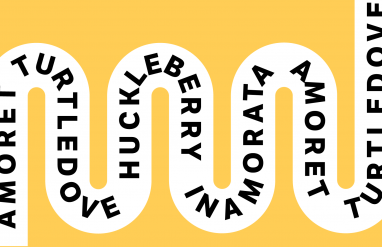The end of the year is a time to reflect on the past and look forward to the future—and/or to simply unwind, let loose, and hang out with friends and family. To help you get in the right mindset for the end of the year, we have pulled insights and advice from writers, entertainers, and thinkers with a wide variety of opinions. While they have different perspectives, they all encourage us to embrace change, do the right thing, and have a sense of humor.
1.
What we call the beginning is often the end
And to make an end is to make a beginning.
The end is where we start from.
—T.S. Eliot, “Little Gidding,” 1942
beginning
T.S. Eliot is well known for his challenging, melancholy modernist poetry (in addition to being the source of inspiration for the musical Cats). The poem “Little Gidding,” the fourth poem in his Four Quartets series is no different. This stanza comments on how tradition (like writing poetry) connects the past to the present, and vice versa. Celebrations of new beginnings, like New Year’s Eve, remind us of these connections.
2.
Closing time, every new beginning
Comes from some other beginning’s end
—Semisonic, “Closing Time,” 1998
end
The rock band Semisonic echoes the sentiment, if not the formality, of T.S. Eliot in these final lyrics from their hit song “Closing Time.” This quote is often attributed to Lucius Annaeus Seneca, an ancient Roman philosopher. While, like many philosophers of his day, Seneca wrote about the nature of time, there’s no evidence he wrote these Semisonic lyrics himself. End is an interesting word in this context, because it can mean both “the concluding part” and “an outcome or result.”
3.
You can’t go back and make a new start, but you can start right now and make a brand-new ending. —James P. Sherman, Rejection, 1982
brand new
True, this is a list of quotes for the end of the year, but this one is good for year-round use. It gives a concrete suggestion for how to make the most of the endings of things. This quote uses the expression brand new, which means “entirely new,” but why? We don’t typically use brand to mean “entirely.” A brand is “a mark made by burning (as in with a hot iron).” The expression is believed to be in reference to something newly forged and glowing from the furnace.
4.
Every new year of my life brings a new happiness and a new kind of freedom; ageing is a gift. —Carmen Maria Machado, The New Statesman, March 17, 2021
freedom
In this quote, author Carmen Maria Machado, known for her short story collection Her Body and Other Parties, talks about how she experiences the passage of time as a kind of freedom. Freedom has many definitions, but Machado may be meaning it here in the sense of “the power to determine action without restraint.” As we get older, it becomes easier to recognize our own agency, meaning “the capacity to act.”
5.
I’m like Chardonnay, get better over time. — Lizzo, “Juice,” 2019
Chardonnay
Musician Lizzo embraces getting older in her 2019 hit “Juice.” She says she is like Chardonnay, “a dry, white wine made with the Chardonnay grape.” Lizzo references the fact that many wines improve with age, becoming more savory and full. While it will depend on the specific wine, Dr. Vinny in Wine Spectator recommends aging Chardonnay wines for five years or less.
6.
I made no resolutions for the New Year. The habit of making plans, of criticizing, sanctioning and molding my life, is too much of a daily event for me. —Anaïs Nin, The Early Diary of Anaïs Nin, 1923-1927
resolutions
Not everyone chooses to use the end of the year as an opportunity to set goals for the new year. One such person was Anaïs Nin, a prolific writer, particularly of journals. She had a whirlwind life (for example, she was once married to two men at once), so perhaps it is understandable she didn’t feel she had time for resolutions. A resolution is “a determination made, as to follow some course of action.”
7.
I think if there’s something one needs to change with oneself, it doesn’t have to happen in the New Year. You can do that any time you please—not that it’s not a good inspirational tactic for the people that it works for. —Brittany Murphy, Entertainment Weekly, December 29, 2006
please
Actor Brittany Murphy echoes Nin’s sentiment in this quote where she says one can change “any time you please”; it isn’t necessary to wait til New Year’s to make new goals. While typically please means “if you would be so obliging,” in this sentence it is used as a verb to mean “to like, wish, or feel inclined.” In other words, you can change whenever you want.
8.
Be at war with your vices, at peace with your neighbors, and let every New Year find you a better man. —Benjamin Franklin, Poor Richard’s Almanac, 1755
vices
Many of the sayings from Benjamin Franklin’s Poor Richard’s Almanac are still commonly in use today, like “early to bed and early to rise makes a man healthy, wealthy and wise.” This one you hear less often, but in it Franklin refers to the difficult goals we set for ourselves to do better as a “war with [our] vices.” Vices here mean “an immoral or evil habit or practice.” However, he advises us to set reasonable goals; we don’t have to be perfect, just “better,” year after year.
9.
I enjoy life when things are happening. I don’t care if it’s good things or bad things. That means you’re alive. Things are happening. —Joan Rivers, NPR, June 11, 2012
happening
One way to approach the end of the year is to simply live in the moment. This is no doubt what the comedian Joan Rivers would have advised. At nearly 80, she remained excited and interested in what was happening. While happening as a verb means anything currently taking place, when used as a noun it can also mean “any event considered worthwhile, unusual, or interesting.”
10.
I never look back, darling. It distracts from the now. — Edna Mode, The Incredibles, 2004
distracts
The character Edna Mode from the animated Pixar film The Incredibles stood out for her big personality, despite her minute stature. She is also an advocate for living in the moment and not dwelling on the past. She finds it distracts her, or “draws away or diverts her mind or attention.”
11.
Youth is when you’re allowed to stay up late on New Year’s Eve. Middle age is when you’re forced to. —Bill Vaughan, writing as “Senator Soaper,” 1958
allowed/forced
Of course, not everyone is upbeat about the passage of time and the end of the year. In this quote, humorist Bill Vaughan describes a dynamic you may be familiar with: the older you get, the less eager you are to stay up on New Year’s Eve. He uses parallel language to drive the point home. Allowed describes a special privilege, while forced describes a punishment.
12.
We shall have our day, my dear.
Where, unwilling, dies the rose
Buds the new, another year.
—Dorothy Parker, “Recurrence,” 1944
buds
Sometimes the end of the year brings out surprising sides of people. We end with this quote from a poem by writer Dorothy Parker. Parker was known for her biting satire, but this poem is romantic and nostalgic. It draws a connection between the circle of time and of life: just like the year ends and the rose dies, a new year stars and a flower buds, or “begins to develop.”
These quotes remind us that there is no wrong way to feel about the end of one year and the beginning of another. Some set goals, others deliberately avoid it. Some are excited about getting older, others not so much. However you celebrate the new year, we hope you have a happy holiday!














